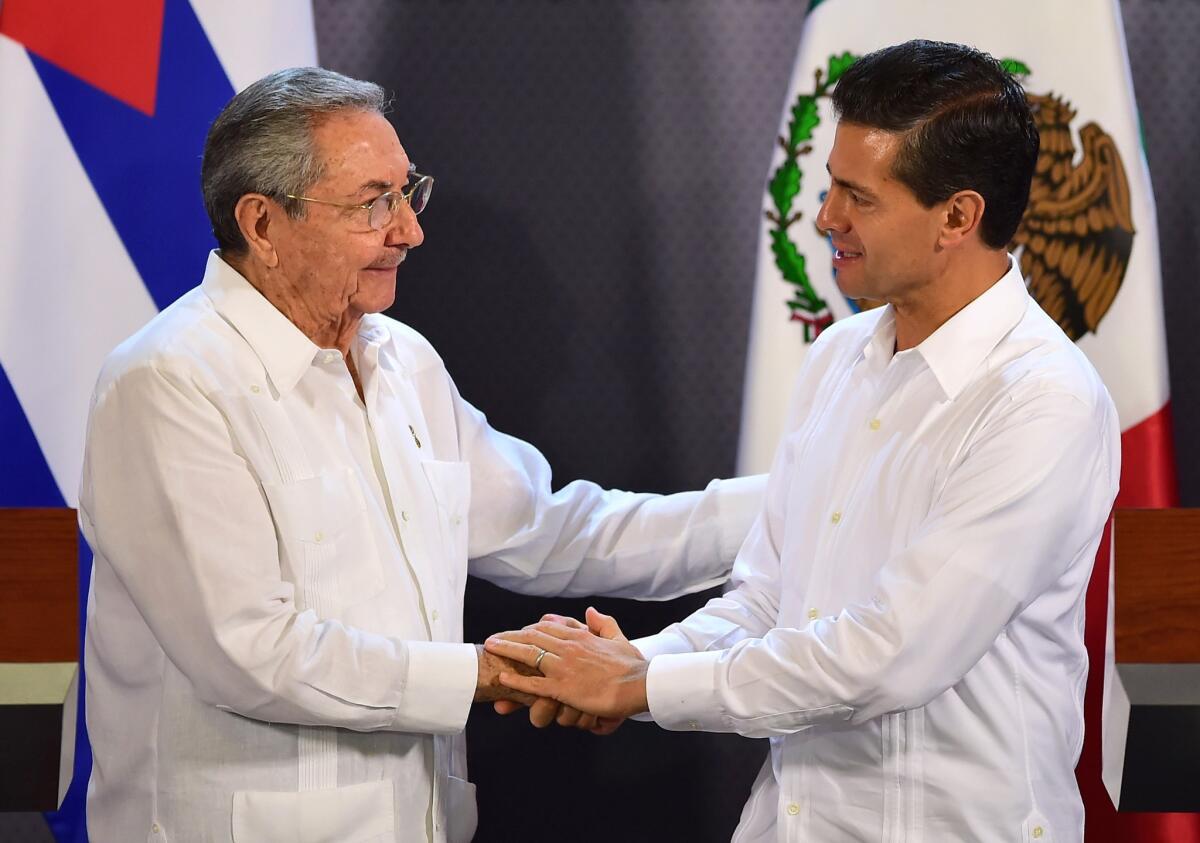The presidents of Mexico and Cuba announce new accords and closer ties

Mexican President Enrique Peña Nieto, right, and Cuban President Raul Castro shake hands during a news conference at the government palace in Merida, Mexico, on Nov. 6.
- Share via
Reporting from Merida, Mexico — The presidents of Mexico and Cuba stressed mutual interests and admiration on Friday, announcing new accords and closer political ties after more than a decade of chilly relations.
Mexican President Enrique Peña Nieto announced agreements to fight human trafficking and exchanges in tourism, education and business designed to increase Mexican investment in Cuba, as well as “a dialogue at the highest political levels.”
Most important, he added, is reestablishing the “affection, respect and admiration that both countries historically have had for each other.”
Peña Nieto greeted Cuba’s Raul Castro at the Yucatan state government palace in Merida, where they held private discussions.
“We also welcome the interest of Mexican companies to do business and invest in Cuba, particularly in the special development zone of Mariel and in sectors such as agriculture and tourism,” Castro said on what was his first state visit to Mexico.
However, no specific commitments or investment plans were announced.
Peña Nieto has made clear that he wants to renew Mexico’s historically close ties with Cuba. His Institutional Revolutionary Party, which ruled for 71 years before losing the presidency in 2000, maintained a respectful relationship with Cuba’s communist government despite U.S. pressure to cut off ties.
In 2002, after traveling to Mexico for a U.N. conference in Monterrey, Cuba’s then-President Fidel Castro accused Vicente Fox, a conservative National Action party politician who had become president two years earlier, of telling him to leave.
Raul Castro, who assumed Cuba’s presidency from his brother in 2006, participated in a Latin America summit in the Mexican resort city of Cancun in 2010, but it was not a state visit.
Among the accords announced Friday is a memorandum of understanding to “guarantee the legal, orderly and safe flow of migration” between the two countries, and to “prevent and combat human trafficking” and related crimes.
The Mexican government has not provided details of the agreement, but it comes as increasing numbers of Cuban migrants are arriving in the nation’s south.
Migration statistics show that from January to September of this year, 6,447 Cubans were stopped for not having proper documentation to be in Mexico, twice the number for all of 2014.
The normalization of relations between Cuba and the United States could ultimately lead to the elimination of the automatic refugee status that Cubans enjoy as soon as they reach U.S. soil. Many Cubans hope to get to the United States before their privileged migratory status ends.
More to Read
Sign up for Essential California
The most important California stories and recommendations in your inbox every morning.
You may occasionally receive promotional content from the Los Angeles Times.













